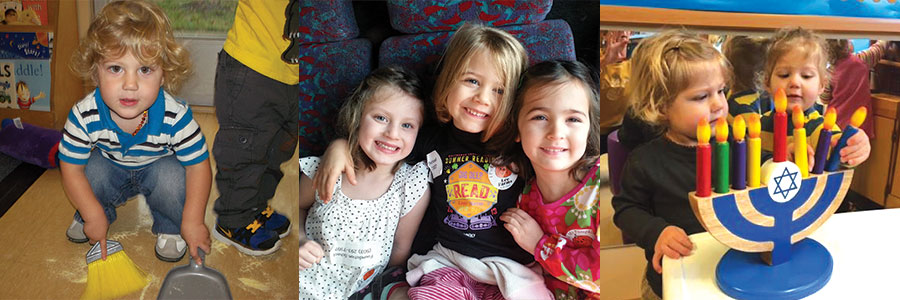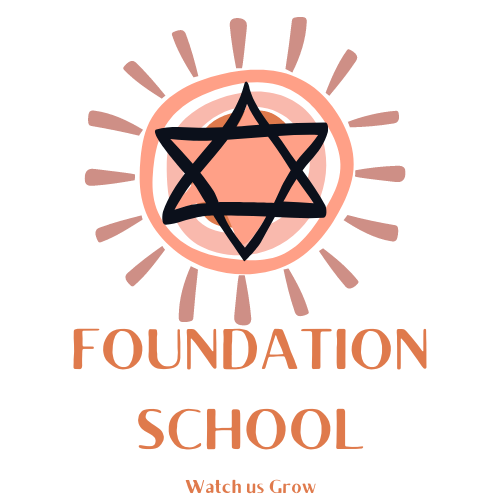Nurturing kind friends and capable learners.

The Foundation School, based on the ideals and traditions of the Jewish faith and open to all, is dedicated to providing exceptional early childhood education. We encourage the development of each child’s creativity, curiosity, and character through age-appropriate practices. By valuing play as a child’s natural way of learning, our qualified and experienced teachers encourage the growth of the total child; intellectual, social, emotional, physical, and spiritual.XX
Our Educational Approach
Foundation School is inspired by the Reggio Emilia educational philosophy. We see our students as infinitely capable, and as such, our teachers collaborate with students to create meaningful and relevant curriculum that inspires the particular group of learners in each classroom community. We believe it is our task to teach our students to be able citizens of our community who have the skills to be independent learners, kind friends, and advocates for themselves as they gain readiness for kindergarten and the world beyond.
What is the Reggio Emilia Philosophy?
In its most basic form, Reggio Emilia is an educational philosophy focused on preschool and primary education that was developed by Loris Malaguzzi in Northern Italy. The philosophy is based on the fundamental principles of respect, responsibility and community through exploration and discovery in a supportive and enriching environment.
Reggio philosophy is put into practice when teachers observe and record what children already know, are curious about, and what challenges them. Teachers then structure the environment to help children expand their academic and social potentials. They do so by encouraging curiosity, discovery and meaningful learning in developmentally appropriate ways. Long-term projects connect core academic areas in and out of the classroom.
As a Reggio-inspired school, we have selected the following core Reggio components into our program at every level: inquiry and emergent curriculum, environment, and documentation.
Inquiry and Emergent Curriculum
Our experienced educators begin each year with a question that they are whole-heartedly curious about based on the students in their class. These questions change each year based on genuine and organic connections between teaching teams and their community of learners. Curriculum unfolds based on the interests of the students and where their imaginations take them.
Environment
Environment plays a huge role in the learning process for young children. We know that children see and appreciate beauty just as adults do, and we build our classroom environments from this premise. For example, we organize art materials by color as our youngest learners begin to recognize and name them. We mount and display art work in a gallery style as our older learners explore what they are capable of.
Environment can also help teach children independence. We put materials within their reach with the expectation that they will learn how to mindfully care for them, to take things out as needed and responsibly put them away when finished. We teach them and then trust them to care for their environment safely.
Documentation
We take seriously both the work and the words of our students. Our teachers take time to document each child’s process of learning at school and take photos of them engaged in activities. We record the words they use, and display their final products with great care. As we listen to their words, write them down, and display them for the whole community to see, they begin to understand that their words have power. This is a crucial building block in their development of both self-esteem and literacy.
Additionally, we believe that early childhood education is not only about the important experiences at school, but also about the reflection of these experiences with family at home. We want parents to see the light-bulb moments each child is having at Foundation School, so they too can be a part of this meaningful process. Parents receive comprehensive weekly emails about what their children are learning at school to facilitate at-home discussion and discovery.
Judaism and Spirituality
Our goal is to make meaning of our time together at Foundation School, through the movement of Jewish time over the course of our year together. Jewish content – both religious and spiritual – is blended into every aspect of our program and curriculum.
For example, all students start the week together with Havdalah led by Rabbi Eve to create mindfulness, thankfulness and intention for the coming week. We celebrate Shabbat on Fridays ending our week together as a community, including a dynamic Shabbat service, and special Shabbat guests. We utilize Hebrew vocabulary, sing traditional songs, and discuss age-appropriate stories from the Torah.
All Jewish holidays are observed and celebrated in our school and as part of the community with age-appropriate experiences.
